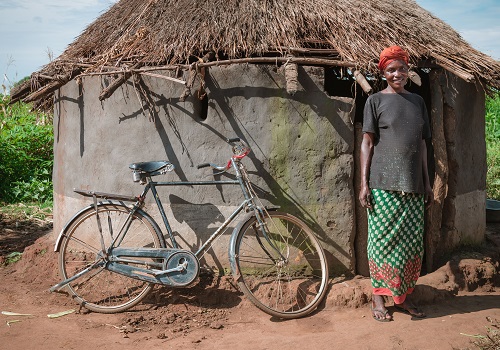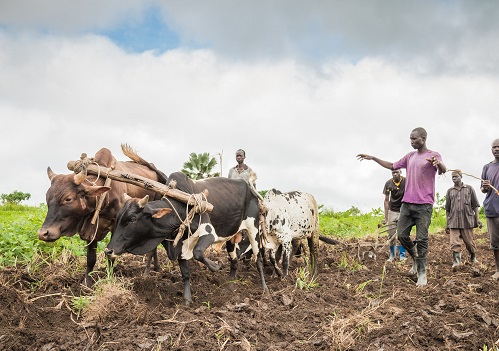In the social enterprise sphere, impact is at the core. Social entrepreneurs see a problem in the world and they choose to actively do something about it. But without a clear culture or mindset of adaptation, organizations can run the risk of becoming irrelevant. Or even worse, they could miss out on opportunities for impact.
For Cycle Connect, the problem we initially saw was the lack of access to transportation in Uganda. But when we realized that the problem turned out to be much larger than we perceived, we adapted to rise to the challenge and to better serve our clients. The gap that we saw was much more about financial inclusion for smallholder farmers. The farmers we were working with didn’t have access to the tools they needed to properly invest in their farm which was holding them back significantly. They needed to be able to unlock the necessary tools to propel them and their families forward.
In order to understand the problem you are solving, you have to get on the ground, deeply understand who you’re serving, figure out how you fit into the broader landscape, and adapt accordingly.
At Cycle Connect, we identified this early on after our first year of full time operations concluded in 2015. Once we identified that we needed to adapt, we did just that. We moved into where we are today – a social enterprise committed to equipping smallholder farmers with the necessary tools to break out of extreme poverty.
It started with a bicycle…
The Cycle Connect journey began when we saw a huge void in transportation for people living in Uganda’s most rural areas. We knew that millions of Ugandans were living in hard to reach areas and this distance created barriers for them to reach critical resources. We knew this was a problem from statistics, but also from personal stories directly from our Founder, Muyambi Muyambi, who grew up in rural Uganda. It’s for these reasons that we initially set out as a lease-to-own bicycle distributor for Ugandans living in deep rural areas.
During our first full year in operation, we validated that the bicycle is a crucial income-generating product and that the financing model of it worked. We watched as customers, such as Lamaro Kevin, used their bicycles to carry crops, help their children reach school, access better healthcare, create new business opportunities and increase income.
We also had a few key realizations: First, 100% of the last-mile clients we sought to serve were smallholder farmers. Second, they had a desire to acquire additional income-generating products on loan. Third, they weren’t able to benefit from product loans from the market solutions in existence. Lamaro, a smallholder farmer in northern Uganda and one of our first clients in 2014, asked us to finance other tools for her family. But our offering was singularly focused on bicycles at that point.
If Lamaro wanted another tool for her farm, she had two options. One, she could turn to her VSLA group and get a small cash loan of $10 – $20 that she would have to pay back over two to three months. But, that’s not really an option because Lamaro needs a bigger loan to properly invest. Option two: Lamaro could turn to the formal sector: microfinance or banks. But, as a smallholder farmer living in a deep rural area, Lamaro is most likely not going to qualify for a loan. And if she does, she could be forced to put his land up as collateral. Lamaro is stuck.
If our model was only going to help Lamaro with transportation, then who was going to help her and her family beyond that?
… But it was always about access and opportunity
As an organization that values being customer-centric, we took this problem and went to our clients first. They had been expressing a desire for more– other products to increase their income, also paid back over time. We decided to put our ears even closer to the ground to understand what more we could do. We chose to further listen in order to adapt.
The reality is, the agricultural value chain is broken in Sub-Saharan Africa. In fact, 25% of the world’s most arable land comes from the region, yet only 10% of the world’s agricultural outputs do (IFAD). That’s a significant gap – one that could be transformed if we looked at the millions of people in Uganda alone that are being left off the table by conservative market solutions that were failing to adapt to meet the specific needs of smallholder farmers. This could be viewed as a problem. Or, for us, we viewed it as an opportunity to rise up and look to close the inefficiency gap.
We saw this exclusion again and again in the customers we served, like Lamaro, who was now able to transport her crops to the market with her bicycle but asked us, “What next?” If the bicycle helped Lamaro get this far, couldn’t we be an entity that helped her realize her fullest potential?
The problem is vast. But ultimately it’s made up of millions of Lamaros – farmers who have significant potential to improve how they till their land, plant their crops, harvest their goods, store them, and then get them to the market.
That’s when we truly realized the power of our model. It was not about the bicycles, but the means by which we were getting those bicycles into the hands of our clients.
We knew we could unlock access and opportunity through the financing of income-generating assets for smallholder farmers. And that’s where we are today. Today, Cycle Connect has grown our portfolio to include oxen and plow, ag-processors, and motorcycles in addition to bicycles to further help farmers mechanize. Our innovations team is dedicated to designing and testing new products to add to our portfolio.
Cycle Connect seeks to be a lifetime partner for our clients as we help them propel forward out of extreme poverty. We envision a world where everyone living in the last mile has the means to thrive, not just survive.
Be willing to adapt and you will be the change
Seeing a problem in the world and being willing to do something about it is the first step towards being responsive. But as social entrepreneurs, we have to build responsive enterprises and that means being willing to continuously adapt. It means not falling in love with your solution, but rather your reason for existence. Sometimes that leads to hard choices that you may think are core to your identity, but in reality are not.
We are not going to solve the world’s biggest problems by standing still. Social entrepreneurs must be willing to get on the ground, ask the hard questions, and most importantly to listen to those we are serving. It is through adaptation on this level that together we can create change.
Molly Burke is the CEO and co-founder of Cycle Connect. Molly has led Cycle Connect from a start-up project to a fully operational enterprise. Under her leadership Cycle Connect has grown across two different cities in Northern Uganda, serving over 5,000 clients all of which is supported by a team of over 30 full-time staff. She led the organization to grow the portfolio of products, moving it from a lease-to-own bicycle distributor to that which serves multiple tools for farmers to pay back over time.
About Cycle Connect
Cycle Connect increases income for East African smallholder farmers through productive asset financing and training. As a Ugandan business with a U.S. nonprofit parent, Cycle Connect has impacted 25,000+ people – increasing their income by an average of 35% using assets throughout the value chain. Our current portfolio includes bicycles, oxen & plow, motorcycles, and grinding machines. Our operations span over 150 miles in Northern Uganda so that Cycle Connect can create access and opportunity for the most last-mile clients. To date, Cycle Connect has disbursed approximately 5,000 loans, including 2,000 over the past twelve months. We’re scaling our product over the next three years to reach 15,000 new customers. Our goal is to move one million rural farmers out of extreme poverty by 2030. Visit cycleconnect.org for more.




Well done Cycle Connect. I wish you have branch here in Papua New Guinea(PNG)
All the best in what you are doing in serving the rural majority of North Africa.
GOD will bless your heart!